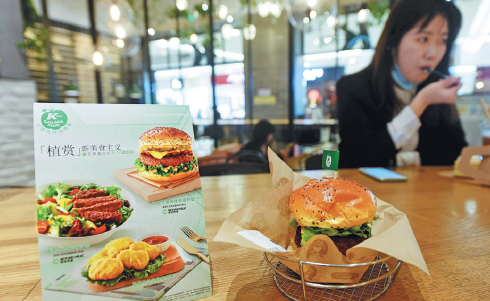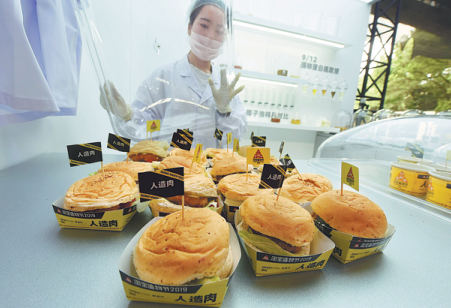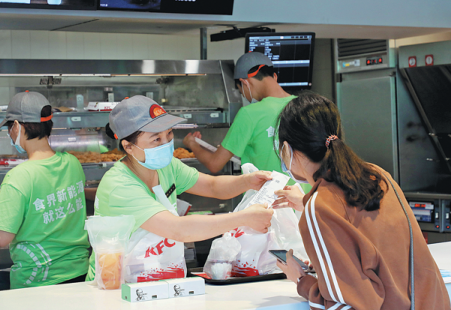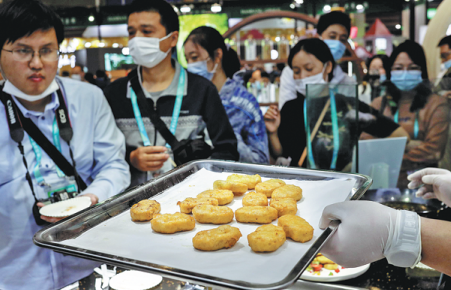Experts say 'fake meat' may not cook up a storm in China

Despite a lukewarm market response so far, manufacturers have high hopes for alternative protein products. Zhang Yangfei reports.
When Hey Tea, one of China's most popular milk tea brands, launched a new burger containing "fake meat" in late May, social media influencers scrambled to try it and make videos and tell their followers how it tasted.
The Future Meat Burger, the tea maker's first plant-based meat substitute, released in partnership with Chinese food tech company Starfield, caused a sensation when it hit the market.
"Is it really meat free? I can't tell at all that it's made from soybeans," said Juzai, a fitness vlogger on Weibo, after filming herself eating two of the burgers. Her video garnered more than 100,000 views.
Hey Tea's meatless burger is just one of a number of candidates in a rapidly heating faux-meat competition that started a few months ago in China.
Though these plant-based meat startups are favored by venture capitalists, they may still face difficulty winning consumer approval in the long run, experts warned.
Artificial protein products debuted in China's food market in the second half of last year, but their presence has mushroomed since April, especially since the arrival of international faux-meat manufacturers.
On April 20, fast-food chain KFC China launched trials of its first plant-based chicken nugget in selected cities, while coffee chain Starbucks added fake beef lasagna and sandwiches to its menu the following day.
Both were supplied by Beyond Meat, a fake-meat producer in the United States that had a successful initial public offering on the Nasdaq last year.
Higher profile
In May, Nestle, the Swiss food and drink giant, announced plans to build a faux-meat factory in Tianjin, the company's first in Asia.
In June, Yum China-which owns the rights to operate KFC, Pizza Hut and Taco Bell in the country-announced it would begin serving the Beyond Burger, a Beyond Meat product, for a limited period.
In late August, a company called Except Meat opened China's first restaurant dedicated to dishes made from plant-based meats in Beijing.
These companies have long been eyeing the Chinese market.
The country is the world's largest meat consumer, and demand for pork and beef is rising. China is also the world's largest pork producer and its high level of meat production has resulted in a large carbon footprint.
Plant-based meat-lauded as a low-cholesterol, healthy foodstuff that is less environmentally damaging than the traditional industry-has won plaudits in the West. Technological advances have allowed the alternatives to compete with meat in terms of flavor and texture.
As more people in China's burgeoning middle class pay closer attention to personal health and the environment, domestic and overseas food tech companies see the market as potentially profitable.
These companies are hoping to attract more consumers by offering meat alternatives. The question is: Will Chinese consumers buy them?
In September, a plant-based startup in Beijing called Zhenmeat launched a trial of products at a chain hotpot restaurant. The items included plant-based meatballs and fake deep-fried pork strips, the most popular ingredients of traditional hotpot.
While people were lining up at lunchtime to select ingredients for their hotpot broth, the startup's staff members introduced their products, telling customers that the plant-based foods were high in protein and low in fat and cholesterol.
Some people were intrigued enough to try the products.
"The deep-fried pork strip tasted like real pork," said one customer."I think this could be a good alternative for people who want to keep fit or lose weight, but I won't buy it because I would rather go for real meat."
According to an April survey by Southern Metropolis Daily in Guangdong province, 52.88 percent of 2,065 respondents said they were unwilling to try fake meat, while 33.3 percent said they had tried some products. Only 8.3 percent said fake meat tasted good.
Ling Chen, a 28-year-old media worker in Beijing, has tried several fake protein products, including sausages made by Whole Perfect Food, a domestic vegetarian food producer. She has also tried Starbucks' fake beef lasagna, fake chicken roll, and faux meat and mushroom rice bowl, plus a fake meatball pizza from Papa John's.
Ling loves soybean products and also often opts for vegetarian dishes because she finds the amount of meat in modern diets is too high.
Curiosity prompted her to try meat alternatives."I just wanted to know to what extent artificial meat can provide the taste and texture of real meat," she said.
After trying the pizza, she said she had no intention of buying it again."The taste is very average. It's just not delicious. It tastes like inferior starchy meatballs," she said.
She added that the Starbucks'lasagna and rice dishes tasted good, but they were too expensive at 69 yuan and 59 yuan ($10 and $8.60) respectively.
The cost was the main reason she would not consider them as daily food choices.
Traditional Chinese cuisine has a long history of using soybeans to mimic meat dishes. Vegetarian "chicken", "duck" and "goose" are among the most common tofu products favored by consumers for health or religious reasons.
They are also very cheap. For example, a 250-gram bag of vegetarian meat costs 11.80 yuan on Alibaba's Freshippo supermarket, compared with 21.10 yuan for the same amount of fresh pork tenderloin or 66.30 yuan for Beyond Meat's plant-based burger patties.
Safety concerns
Food safety is another big concern for Chinese consumers.
According to a report released by global market researcher Ipsos in August, 74 percent of respondents said they were worried that plant-based meat substitutes would be overprocessed and contain too many additives, while 64 percent expressed concern about the absence of industry standards.
He Hongyi, who works for a technology company in Beijing, said she would not try faux meat because she knew little about it and was worried about the risks.
"Man-made meat might have something to do with genes and cells. You have to make it both understandable and affordable-these are the two indispensable factors," she said.
Ling, the media worker, said she had read articles about plant-based meat, which she concluded was a kind of highly processed food made via several complicated procedures that retailers boasted was "high technology".
"I am not sure if the nutritional value is really so good. On the contrary, I tend to find old-fashioned Chinese soy products more reassuring because they are made with more traditional processing methods," she said.
Lyu Zhongming, Zhenmeat's founder, said the market is still at an early stage, and three main types of people are likely to be attracted to it: young people, driven by curiosity; those returning from overseas and pursuing a better quality of life; and people with special needs because of health conditions or religious beliefs.
While acknowledging that faux-meat products have not yet succeeded in breaking into mainstream diets, Lyu sees potential because he believes plant-based meat can provide a solution to the problem of future protein supply.
"There is continuous growth in Chinese consumers' demand for meat. We face a gap of 10 million metric tons of meat this year, which is being filled by imports," he said.
"This is the opportunity we see. People's demand for meat will become even greater, but there will be a gap in the supply of animal protein. So, in the future, plant-based protein can become a perfect supplement and may change people's lifestyles."
Freelance food engineering expert Yun Wuxin said the faux-meat industry is a booming investment option in China and is attracting great interest.
"Many people will try it out of curiosity, but according to my experience, overall consumer feedback is unsatisfactory," he said.
"To put it bluntly, the domestic industry and capital are still confused about their positioning. They just think it is trendy and cool, and they do not have a clear picture of consumer market demand and future positioning."
Future tasks
According to Yun, the domestic faux-meat market is very different from that in Western countries, which has very clear selling points.
First, a boom in vegetarianism overseas has seen a large number of consumers opt for plant-based cuisine.
Second, environmentalists claim production of plant-based protein emits fewer greenhouse gases than raising livestock. This campaign is very popular abroad, encouraging numerous young people to turn to a plant-based diet.
"These are the two most important points. But it's very hard to say how many people in China will actually accept and deal with them," Yun said, adding that he is not particularly optimistic.
He added that faux-meat manufacturers urgently need to bring the taste closer to that of real meat and push prices as low as possible.
"Price is not a serious factor in Western countries because many people are willing to pay for the sake of vegetarianism and sustainable development of the planet. But how many people in China are willing to pay a higher price for fake meat over real meat remains very uncertain," he said.
Yun pointed out that even if prices could be dragged lower than those for real meat, which is technically achievable, there would be concerns that people would only try the products out of curiosity.
That perceived lack of a long-term market could see the sector becoming less attractive to investors and the food industry.
"It remains to be seen how exactly this sector will develop," he said.
Contact the writer at zhangyangfei@chinadaily.com.cn

























